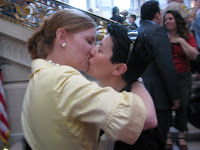Yesterday, California joined the ranks of six other jurisdictions around the globe that permit same-sex couples to marry, including:
Belgium, Canada, Massachusetts (USA), the Netherlands, South Africa, and Spain.
Spain.In so doing, the California Supreme Court took a leap in equal protection jurisprudence that few courts in the United States have been willing to make – that laws making distinctions based on sexual orientation deserve review under the
strict scrutiny standard (generally reserved for "suspect classes" like race, sex, or religion). The California Supreme Court considered that gays and lesbians already had access to statutorily created domestic partnerships, which provided many of the same rights and obligations as marriage, but nonetheless
decided (p. 9) that
the current California statutes . . . must be viewed as potentially impinging upon a same-sex couple’s constitutional right to marry under the California Constitution.
This fundamental right to marriage, the Court wrote (p. 7), is protected by the California Constitution, which
must be interpreted to guarantee this basic civil right to all Californians, whether gay or heterosexual, and to same-sex couples as well as to opposite-sex couples.

The ruling was met with great enthusiasm. Political leaders, activists, and ordinary citizens gathered at San Francisco City Hall to celebrate the news. Gay and lesbian organizations throughout the state celebrated. The gatherings were marked by laughter and tears of joy. In
thirty days, the Court-required waiting period, many of the revelers will be joined in the first truly legal, state-sanctioned marriages between people of the same sex in California.
But gay rights opponents have been

anticipating this decision, and the Secretary of State is
currently reviewing signatures to determine whether a ballot measure to change the California Constitution to limit marriage to unions between one man and one woman will be voted upon in November. But in the meantime, gay couples are not deterred, and are
already planning their weddings. This is one step in the global movement of gay rights as human rights. And marriage is just the tip of the iceberg. While marriage bills are also currently
being debated in Norway and Sweden, the past year has brought big changes, including the European Court of Human Rights’

decision in
E.B. v. France that
Council of Europe States may not discriminate against gays and lesbians in adoption proceedings. But the struggle for gay rights is far from over, as in many countries around the world, gays and lesbians “
face violence and inequality – and sometimes torture, even execution” because of their sexual orientation.
But each victory counts, and there can be no denying it, yesterday the California Supreme Court made human rights history!
(All photos © Kathleen Doty)
 An e-mail just received from my Law Librarian, Erin Murphy, identifies the pith of the trial court judgment against Proposition 8, the voter initiative that made a prohibition on same-sex marriage part of California's Constitution. (Prior IntLawGrrls posts available here.) With a hat tip to Erin, here's the money quote by U.S. District Judge Vaughn R. Walker, Northern District of California:
An e-mail just received from my Law Librarian, Erin Murphy, identifies the pith of the trial court judgment against Proposition 8, the voter initiative that made a prohibition on same-sex marriage part of California's Constitution. (Prior IntLawGrrls posts available here.) With a hat tip to Erin, here's the money quote by U.S. District Judge Vaughn R. Walker, Northern District of California:

















